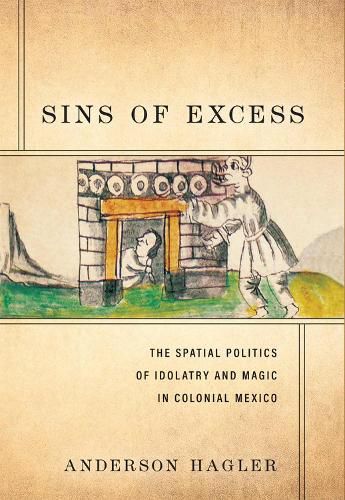Readings Newsletter
Become a Readings Member to make your shopping experience even easier.
Sign in or sign up for free!
You’re not far away from qualifying for FREE standard shipping within Australia
You’ve qualified for FREE standard shipping within Australia
The cart is loading…






For the Spanish colonizers of Mexico in the sixteenth century, the concept of 'excess' - even the word itself - covered a multitude of sins, including idolatry and magic. In Sins of Excess, Anderson Hagler uses the language of excess as a lens for examining how the colonizers of New Spain conflated cultural diversity into a superficially - and usefully - homogeneous whole under the pejorative umbrella of excess in its many forms. In this way, Hagler suggests, deploying excess and its derivatives influenced how Spanish colonists came to view the practices of the Indigenous population.
In the viceroyalty of New Spain descriptive terms such as 'harms and excesses' (dan os y excesos) not only referred to crimes like murder and robbery (muertes y robos) but also became generalized to refer to Native religious, social, or cultural practices that fell outside the boundaries of Catholic orthodoxy. A reading of royal decrees and ecclesiastical missives, commoner testimony from criminal cases, and the trials of the Mexican Inquisition reveals a calculated rhetorical strategy that gathered non-European social-cultural experiences into a negative category. Consequently, 'excess' provides an analytical framework for understanding how colonial officials interacted with Indigenous peoples and those of African descent as they attempted to impose social order.
While primary sources in non-European languages such as Nahuatl reveal a similar preoccupation with excess, Hagler reveals in this insightful book how incongruities between Nahua and Spanish interpretations of the term extended through the colonial era and generated increasing conflict.
$9.00 standard shipping within Australia
FREE standard shipping within Australia for orders over $100.00
Express & International shipping calculated at checkout
For the Spanish colonizers of Mexico in the sixteenth century, the concept of 'excess' - even the word itself - covered a multitude of sins, including idolatry and magic. In Sins of Excess, Anderson Hagler uses the language of excess as a lens for examining how the colonizers of New Spain conflated cultural diversity into a superficially - and usefully - homogeneous whole under the pejorative umbrella of excess in its many forms. In this way, Hagler suggests, deploying excess and its derivatives influenced how Spanish colonists came to view the practices of the Indigenous population.
In the viceroyalty of New Spain descriptive terms such as 'harms and excesses' (dan os y excesos) not only referred to crimes like murder and robbery (muertes y robos) but also became generalized to refer to Native religious, social, or cultural practices that fell outside the boundaries of Catholic orthodoxy. A reading of royal decrees and ecclesiastical missives, commoner testimony from criminal cases, and the trials of the Mexican Inquisition reveals a calculated rhetorical strategy that gathered non-European social-cultural experiences into a negative category. Consequently, 'excess' provides an analytical framework for understanding how colonial officials interacted with Indigenous peoples and those of African descent as they attempted to impose social order.
While primary sources in non-European languages such as Nahuatl reveal a similar preoccupation with excess, Hagler reveals in this insightful book how incongruities between Nahua and Spanish interpretations of the term extended through the colonial era and generated increasing conflict.